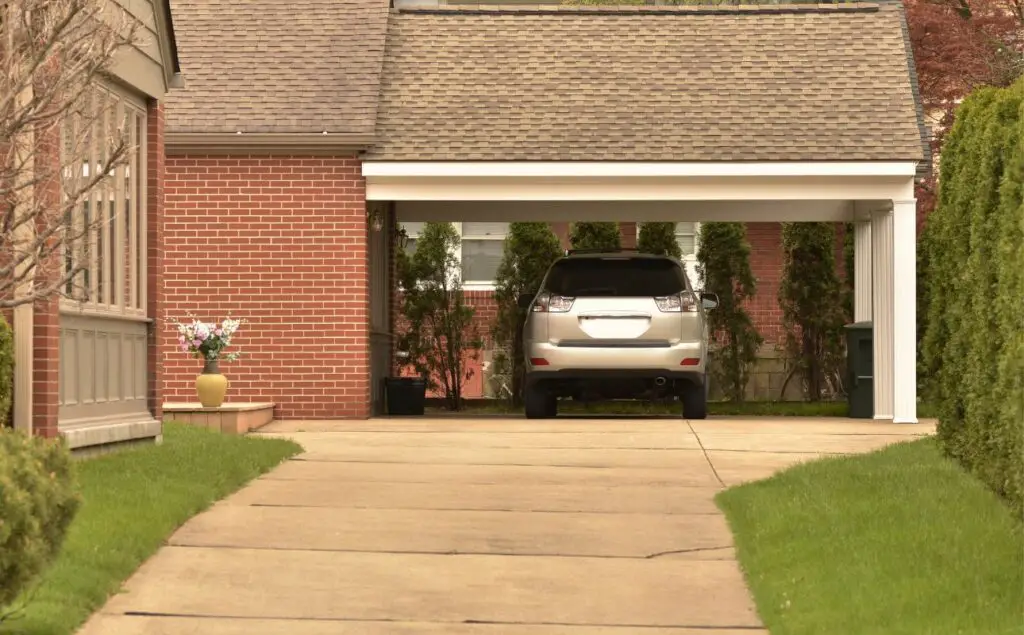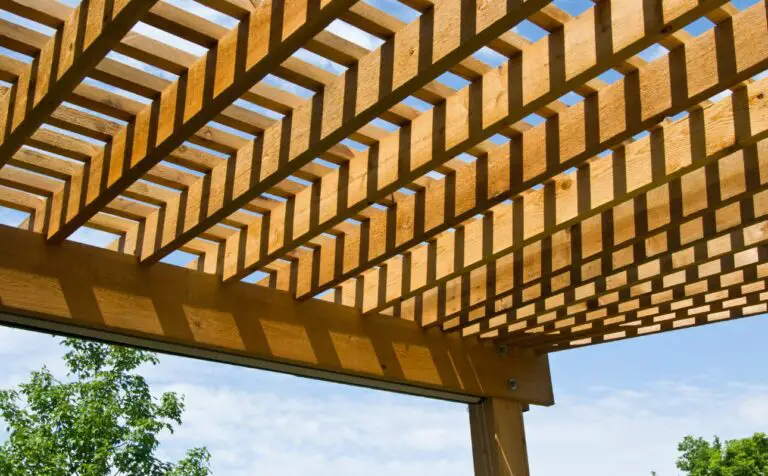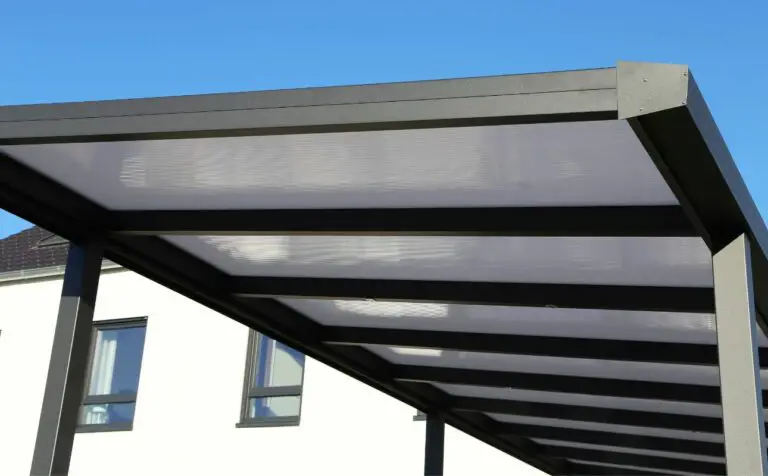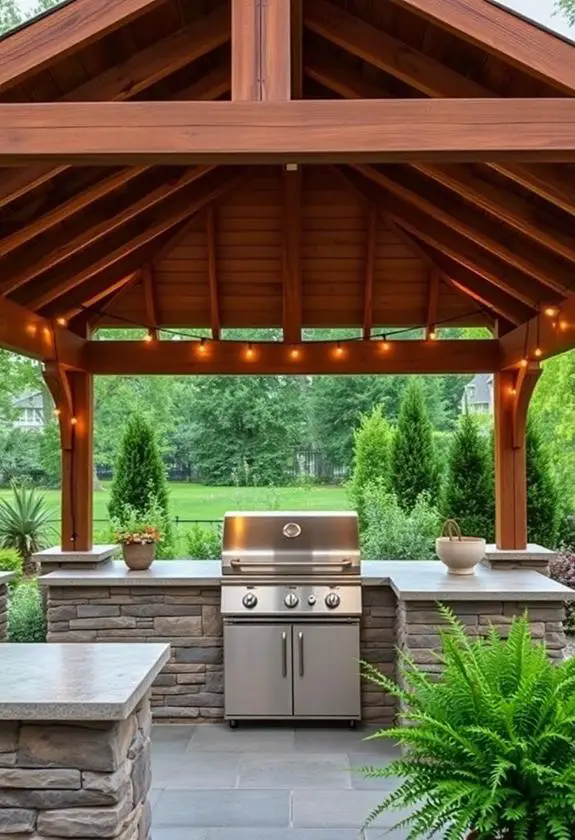Carports are an affordable and convenient way to protect your vehicles from the elements, especially if you do not have a garage. Before installing one in your driveway, it is important to consider various factors such as zoning laws and homeowner’s association rules that may restrict or regulate the installation of carports in residential areas.
This article aims to provide readers with information on whether or not they can put a carport in their driveway. It will discuss:
- How to check local zoning laws and homeowner’s association rules
- What type of carport is suitable for your needs
- How to hire a professional contractor for installation
This article will also cover maintenance tips for keeping your carport in good condition. Following these guidelines, readers can make informed decisions about installing a carport in their driveway while adhering to the regulations set by their community.

Check Your Local Zoning Laws
The permissibility of adding a covered parking structure in a residential driveway is contingent upon adherence to local zoning regulations, which must be consulted prior to any construction.
It is essential to research requirements and permits the application process for building carports in your area because zoning laws may vary depending on your location.
Your city or county may require certain permits, fees, and inspections before erecting a carport on your property. Failure to comply with these regulations can result in fines or even the removal of the structure.
Consider Your Homeowner’s Association Rules
Homeowners must review the regulations set by their HOA before building any structures on their property, including carports.
The homeowner’s association may require approval for any new structures, which means that homeowners need to submit an application detailing the carport design and location.
Some homeowners’ associations have strict guidelines regarding the types of materials used in construction or specific colors allowed for the carport. It is essential to consider these guidelines before purchasing or installing a carport to avoid violating any HOA restrictions.
Choose the Right Type of Carport
Choosing the appropriate carport type is a crucial decision that homeowners must make, as it can significantly impact their property’s overall aesthetic appeal and functionality.
When choosing the right type of carport, homeowners need to consider their preferences and needs. Two common types of carports are metal and canvas. Metal carports are more durable and long-lasting compared to canvas ones, which are ideal for temporary or portable use.
There is an option between attached and freestanding models. Attached carports provide easy access to vehicles from the home while freestanding ones offer flexibility in placement.
Hire a Professional Contractor
Finding a reputable contractor is critical when it comes to hiring a professional for your project. It is important to research different contractors and read reviews from previous clients to ensure that you choose the best one for your needs.
Find a Reputable Contractor
To ensure a successful installation of a carport, it is recommended to research options and find a reputable contractor with extensive experience in constructing outdoor structures.
One way to find such contractors is by asking for referrals from friends, family, or neighbors who have had similar work done on their properties. It is also important to check the contractor’s credentials and certifications to ensure they are licensed and insured.
Looking at online reviews can also provide insight into the quality of work that the contractor delivers.
Get Quotes and Compare Prices
Obtaining quotes and comparing prices from multiple reputable contractors is an essential step in ensuring a cost-effective and efficient installation of an outdoor structure.
While some may consider DIY options to save on costs, it is important to note that professional contractors have the experience, equipment, and knowledge necessary to ensure a safe and long-lasting carport installation.
When requesting quotes, be sure to inquire about any financing options that may be available to help offset the initial costs. Comparing prices can also help you identify any potential hidden fees or additional expenses that may arise during the installation process.
To simplify this process, consider creating a nested bullet point list with sub-lists for each contractor’s pricing breakdown, timeline estimates, and any guarantees or warranties they offer.
Maintain Your Carport
It is essential to clean the carport regularly and remove any debris or dirt buildup on the roof and supports. This will prevent water from pooling on the structure, which can cause rust and weaken the metal.
Rust prevention is crucial in maintaining a carport’s longevity, so inspecting for rust or corrosion is vital. If any signs of rust are present, it is recommended to remove it with a wire brush and apply a protective coating to prevent further damage.
Weatherproofing tips include applying sealant around seams and joints to prevent water from entering under the roof panels. Ensure that all bolts and screws are tightened regularly as they can loosen over time due to weather conditions, causing potential structural damage if left unchecked.
Is a Carport as Good as a Garage?
When considering options for vehicle protection and storage, the question often arises: Is a carport as good as a garage? Let’s delve into the details and compare the two options.
- Protection and Coverage
Both carports and garages provide shelter for vehicles, protecting them from the elements. Garages offer more comprehensive coverage as they have four walls and a roof, offering better protection against rain, snow, wind, and theft. Carports, on the other hand, provide an overhead roof but are open-sided, leaving the vehicle partially exposed to the elements.
- Cost and Installation
In terms of cost, carports tend to be more affordable than garages. Carports generally require less material and labor for construction. They are also easier and faster to install, often requiring only a few hours or days compared to the longer construction time associated with garages.
- Versatility and Flexibility
Carports offer greater versatility and flexibility compared to garages. They can be easily relocated if needed and are suitable for various applications beyond vehicle storage, such as providing shade for outdoor gatherings or serving as a covered workspace. Garages, on the other hand, are fixed structures and provide limited adaptability.
- Property Value and Aesthetics
Garages are typically more valued in terms of property appraisal and resale value. They offer additional enclosed space that can be utilized for storage or converted into living areas. Garages are often considered more aesthetically pleasing, blending seamlessly with the architectural style of a home. Carports, although functional, may not contribute as significantly to property value and may have a simpler design.
The Bottom Line
Adding a carport to your driveway can be a practical and cost-effective solution for protecting your vehicle from the elements. It is important to first check your local zoning laws and homeowner’s association rules to ensure you are allowed to do so.
Choosing the right type of carport and hiring a professional contractor will also help ensure that you have a sturdy and reliable structure that meets your specific needs. Just like any other structure, regular maintenance of your carport is crucial in ensuring its longevity.
This includes cleaning it regularly, inspecting it for damage or wear and tear, and making any necessary repairs promptly. So why not take the first step towards safeguarding your vehicle today?
FAQ
What are the cost implications of installing a carport in your driveway?
The cost of installing a carport in a driveway can vary depending on factors such as the size, material, design, and additional features of the carport, as well as labor costs and local market conditions. On average, it can range from a few hundred to several thousand dollars.
How long does it take to install a carport in your driveway?
The time required to install a carport in a driveway can vary depending on factors such as the size of the carport, the complexity of the installation, and the expertise of the installer. Typically, it can take anywhere from a few hours to a couple of days.
Can you customize the design of your carport to match your home’s architecture?
Yes, carports can be customized to match the architecture of your home. Various design options, including roof styles, colors, materials, and finishes, are available to ensure the carport complements your home’s aesthetics and blends seamlessly with its architectural style.
Are there any safety concerns that need to be taken into account when installing a carport in your driveway?
Yes, safety concerns should be considered when installing a carport in your driveway. Some key factors to address include ensuring proper anchoring to withstand weather conditions, sufficient clearance for vehicles and pedestrians, and compliance with local building codes and regulations to ensure structural integrity and safety.
Are there any environmental factors to consider when choosing a carport material?
Yes, when choosing a carport material, it’s important to consider environmental factors. Some materials, such as steel or aluminum, are durable, recyclable, and require minimal maintenance. Wood may offer a natural aesthetic but requires more maintenance. Consider the impact of the material’s production and disposal on the environment.





